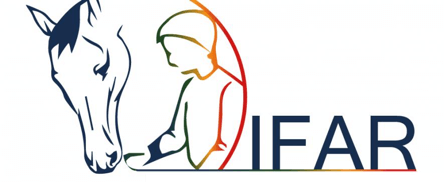The third session of the International Forum for the Aftercare of Racehorses’ (IFAR) virtual conference series concluded Tuesday following speeches on the various paths for Thoroughbreds in different countries at the conclusion of their racing careers. This session was the third in a series of four webinars that compose the 2021 IFAR Conference.
The webinar, “Global Insights on Aftercare (Aftercare Providers, Equine Charities),” was moderated by Donna Brothers, who is part of the horse racing coverage team for NBC Sports in the United States. The list of speakers consisted of Stacie Clark, operations consultant, Thoroughbred Aftercare Alliance (U.S.); Lisa Coffey, founder and director, Racing Hearts (AUS); John Osborne, director of Equine Welfare and Bloodstock, Horse Racing Ireland; Dr. Ignacio Pavlovsky, veterinarian, owner, and breeder (ARG); and Kristin Werner, senior counsel, The Jockey Club, and administrator, Thoroughbred Incentive Program (U.S.).
Clark and Werner described the path from the racetrack to placement into accredited aftercare programs. They emphasized the importance of these organizations’ promoting themselves and communicating to the Thoroughbred industry that they exist so that horse owners are aware of the retirement options for their former racehorses.
“The biggest disconnect that we have is that people don’t know what’s out there,” Clark said.
According to Werner, “Part of any aftercare program should be the permanent retirement of the horse’s racing eligibility. This is accomplished through The Jockey Club’s Transferred as Retired from Racing process. This ensures a horse will no longer be eligible to race, while maintaining eligibility for breeding and second careers.”
Coffey’s Racing Hearts retrains off-the-track Thoroughbreds for use in equine-assisted therapy and other careers. It is the first charity of its kind in Australia and currently has a waiting list of about 50 clients. Coffey stated that Thoroughbreds are especially suited to therapy due to their willingness to please.
“Horses and other animals offer a genuinely non-judgmental relationship. They have no other agenda other than actually wanting to be with us,” she said.
Osborne indicated that aftercare has become a priority for the Irish Thoroughbred industry relatively recently, as perspectives have shifted from viewing horses as commodities to viewing them as individual, sentient beings. Last year, Treo Eile was founded in Ireland to assist racehorse trainers and owners who wish to rehome and retrain horses once their racetrack careers are complete.
“Ultimately, our catchphrase is that ownership comes with the responsibility to the animal, not just on the glory days but in the dog days, too, where things are not so promising, where the dreams are behind those horses, but the responsibility still remains to look after that horse properly and do what’s best for that horse at all times,” Osborne said.
In Argentina, Pavlovsky indicated that Thoroughbreds are in high demand due to their versatility to be retrained in disciplines such as polo, jumping, and pulling carriages. Compared to other jurisdictions, it is much easier to place racehorses in homes following their retirement from racing.
“Today, the welfare of horses is something that we have to be extremely dedicated to and think about,” Pavlovsky said. “Horses are more than our business. They are our way of living.”
The 2021 IFAR Conference concludes 27 April with a final panel, “Aftercare for Racing Industry Participants: Owners, Breeders, and Trainers.” It will begin at 12 p.m. GMT (1 p.m. in the U.K.) and be moderated by Francesca Cumani, horse racing presenter in the U.K. and Australia. Speaking will be Mark Fisher, Kotare Bioethics Ltd, Wellington, New Zealand; Dr. Eliot Forbes, chief executive officer, AniMark Ltd. (AUS), and member, IFAR Steering Committee; Tom Reilly, chief executive officer, Thoroughbred Breeders Australia and Aushorse; and Dr. Christopher Riggs, director, Equine Welfare Research Foundation, and chief advisor, Veterinary Science, The Hong Kong Jockey Club.
The full schedule of webinars, including speakers, moderators, presentation topics, bios, and the link to register can be found at internationalracehorseaftercare.com/virtual-ifar/. All sessions are free, but registration is required. Those who attend each session live will be able to ask questions to presenters. A recording of the first three sessions is available at internationalracehorseaftercare.com/help-resources/conference-resources/ifar-conference-2021/.
IFAR has previously been held in conjunction with the Asian Racing Conference in Cape Town, South Africa, in February 2020; the European & Mediterranean Horseracing Federation’s General Assembly in Oslo, Norway, in May 2019; the Asian Racing Conference in Seoul, South Korea, in May 2018; and the Pan American Conference in Washington, D.C., in May 2017.
IFAR is an independent forum that recognizes geographical and industry differences among racing countries and is designed to enhance Thoroughbred aftercare worldwide. Working with the International Federation of Horseracing Authorities, IFAR will raise awareness of the importance of welfare for Thoroughbreds, improve education on lifetime care, and help increase demand for former racehorses in other equestrian sports. For more information on IFAR, visit internationalracehorseaftercare.com.
